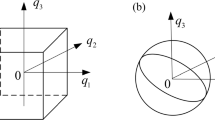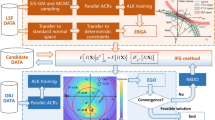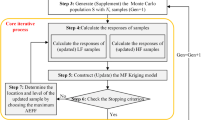Abstract
Due to lack of sufficient data and information in engineering practice, it is often difficult to obtain precise probability distributions of some uncertain variables and parameters in reliability-based design optimization (RBDO). In this paper, distributional probability-box (p-box) model is employed to quantify these uncertain variables and parameters. To reduce the computational cost in RBDO associated with expensive and time-consuming constraints, an active learning Kriging-assisted method is proposed. In this method, the sequential optimization and reliability assessment (SORA) method is extended for RBDO under distributional p-box model. Kriging metamodels are constructed to make the replacement of actual constraints. To remove unnecessary computational expense on constructing Kriging metamodels, a screening criterion is built and employed for the judgment of active constraints in RBDO. Then, an active learning function is defined to find out update samples, which are adopted for sequentially refining Kriging metamodel of each active constraint by focusing on its limit-state surface (LSS) around the most probable target point (MPTP) at the solution of SORA. Several examples, including a welded beam problem and a piezoelectric energy harvester design, are provided to test the accuracy and efficiency of the proposed active learning Kriging-assisted method.










Similar content being viewed by others
Abbreviations
- P(⋅):
-
Probability of an event
- g(⋅):
-
Constraint function
- f(⋅):
-
Object function
- d :
-
Vector of deterministic variables
- d l :
-
Lower bound vector of deterministic variables
- d u :
-
Upper bound vector of deterministic variables
- X :
-
Vector of p-box variables
- x :
-
Realization of X
- μ x :
-
Vector of the nominal values of X
- \( {\boldsymbol{\upmu}}_{\mathbf{x}}^l \) :
-
Lower bound vector of μx
- \( {\boldsymbol{\upmu}}_{\mathbf{x}}^u \) :
-
Upper bound vector of μx
- P :
-
Vector of p-box parameters
- p :
-
Realization of P
- μ p :
-
Vector of the nominal values of P
- \( {\boldsymbol{\upmu}}_{\mathbf{p}}^l \) :
-
Lower bound vector of distribution mean of P
- \( {\boldsymbol{\upmu}}_{\mathbf{p}}^u \) :
-
Upper bound vector of distribution mean of P
- σ p :
-
Vector of the distribution standard deviation of P
- \( {\boldsymbol{\upsigma}}_{\mathbf{p}}^u \) :
-
Upper bound vector of σp
- Z :
-
Vector containing both X and P
- z :
-
Realization of Z
- μ z :
-
Vector of the nominal values of Z
- Y :
-
Vector of interval distribution parameters of Z
- y :
-
Realization of Y
- z MPTP :
-
The most probable target point of Z
- s :
-
Offset vector of Z
- W :
-
Vector of random parameters with the standard normal distribution
- w :
-
Realization of W
- R l :
-
Lower bound of the reliability degree of a constraint
- R u :
-
Upper bound of the reliability degree of a constraint
- R t :
-
Target reliability degree of a constraint
- β t :
-
Target reliability index of a constraint
- \( \hat{g}\left(\cdot \right) \) :
-
Mean of Kriging prediction
- \( {\sigma}_{\hat{g}}^2\left(\cdot \right) \) :
-
Variance of Kriging prediction
- Φ(⋅):
-
Cumulative distribution function of the standard normal distribution
- U(⋅) :
-
A learning function (Echard et al. 2011)
- Fp(⋅):
-
An active learning function proposed in this work
References
Alvarez DA, Uribe F, Hurtado JE (2018) Estimation of the lower and upper bounds on the probability of failure using subset simulation and random set theory. Mech Syst Signal Process 100:782–801
Au SK, Beck JL (2001) Estimation of small failure probabilities in high dimensions by subset simulation. Probabilistic Eng Mech 16:263–277
Basudhar A, Missoum S (2010) An improved adaptive sampling scheme for the construction of explicit boundaries. Struct Multidiscip Optim 42:517–529
Beer M, Ferson S, Kreinovich V (2013) Imprecise probabilities in engineering analyses. Mech Syst Signal Process 37:4–29
Bichon BJ, Eldred MS, Swiler LP et al (2008) Efficient global reliability analysis for nonlinear implicit performance functions. AIAA J 46:2459–2468
Chen Z, Qiu H, Gao L et al (2014) A local adaptive sampling method for reliability-based design optimization using Kriging model. Struct Multidiscip Optim 49:401–416
Chen Z, Peng S, Li X et al (2015) An important boundary sampling method for reliability-based design optimization using kriging model. Struct Multidiscip Optim 52:55–70
de Angelis M, Patelli E, Beer M (2015) Advanced line sampling for efficient robust reliability analysis. Struct Saf 52:170–182
Du X, Chen W (2004) Sequential optimization and reliability assessment method for efficient probabilistic design. J Mech Des 126:225
Echard B, Gayton N, Lemaire M (2011) AK-MCS: an active learning reliability method combining Kriging and Monte Carlo simulation. Struct Saf 33:145–154
Ferson S (1996) What Monte Carlo methods cannot do. Hum Ecol Risk Assess An Int J 2:990–1007
Ferson S, Ginzburg LR (1996) Different methods are needed to propagate ignorance and variability. Reliab Eng Syst Saf 54:133–144
Ferson S, Hajagos JG (2004) Arithmetic with uncertain numbers: rigorous and (often) best possible answers. Reliab Eng Syst Saf 85:135–152
Guan XL, Melchers RE (2001) Effect of response surface parameter variation on structural reliability estimates. Struct Saf 23:429–444
Huang ZL, Jiang C, Zhou YS et al (2017) Reliability-based design optimization for problems with interval distribution parameters. Struct Multidiscip Optim 55:513–528
Jiang C, Li WX, Han X et al (2011) Structural reliability analysis based on random distributions with interval parameters. Comput Struct 89:2292–2302
Kang Z, Luo Y (2010) Reliability-based structural optimization with probability and convex set hybrid models. Struct Multidiscip Optim 42:89–102
Keshtegar B, Kisi O (2017) M5 model tree and Monte Carlo simulation for efficient structural reliability analysis. Appl Math Model 48:899–910
Keshtegar B, Kisi O (2018) RM5Tree: radial basis M5 model tree for accurate structural reliability analysis. Reliab Eng Syst Saf 180:49–61
Keshtegar B, Meng D, Seghier MEA, Ben et al (2020) A hybrid sufficient performance measure approach to improve robustness and efficiency of reliability-based design optimization. Eng Comput. https://doi.org/10.1007/s00366-019-00907-w
Koutsourelakis PS, Pradlwarter HJ, Schuëller GI (2004) Reliability of structures in high dimensions, part I: algorithms and applications. Probabilistic Eng Mech 19:409–417
Lee TH, Jung JJ (2008) A sampling technique enhancing accuracy and efficiency of metamodel-based RBDO: constraint boundary sampling. Comput Struct 86:1463–1476
Lee I, Noh Y, Yoo D (2012) A novel second-order reliability method (SORM) using noncentral or generalized chi-squared distributions. J Mech Des 134:100912
Li F, Sun G, Huang X et al (2015a) Multiobjective robust optimization for crashworthiness design of foam filled thin-walled structures with random and interval uncertainties. Eng Struct 88:111–124
Li G, Lu Z, Xu J (2015b) A fuzzy reliability approach for structures based on the probability perspective. Struct Saf 54:10–18
Li X, Qiu H, Chen Z et al (2016) A local Kriging approximation method using MPP for reliability-based design optimization. Comput Struct 162:102–115
Liang J, Mourelatos ZP, Nikolaidis E (2007) A single-loop approach for system reliability-based design optimization. J Mech Des 129:1215–1224
Meng Z, Zhou H (2018) New target performance approach for a super parametric convex model of non-probabilistic reliability-based design optimization. Comput Methods Appl Mech Eng 339:644–662
Meng Z, Zhang D, Liu Z, Li G (2018) An adaptive directional boundary sampling method for efficient reliability-based design optimization. J Mech Des 140:121406
Meng Z, Zhang Z, Zhou H (2020) A novel experimental data-driven exponential convex model for reliability assessment with uncertain-but-bounded parameters. Appl Math Model 77:773–787
Mourelatos ZP, Zhou J (2008) Reliability estimation and design with insufficient data based on possibility theory. AIAA J 43:1696–1705
Pedroni N, Zio E, Apostolakis GE (2010) Comparison of bootstrapped artificial neural networks and quadratic response surfaces for the estimation of the functional failure probability of a thermal–hydraulic passive system. Reliab Eng Syst Saf 95:386–395
Schöbi R, Sudret B (2017) Structural reliability analysis for p-boxes using multi-level meta-models. Probabilistic Eng Mech 48:27–38
Seong S, Hu C, Lee S (2017) Design under uncertainty for reliable power generation of piezoelectric energy harvester. J Intell Mater Syst Struct 28:2437–2449
Shayanfar MA, Barkhordari MA, Roudak MA (2017) An efficient reliability algorithm for locating design point using the combination of importance sampling concepts and response surface method. Commun Nonlinear Sci Numer Simul 47:223–237
Song H, Choi KK, Lee I et al (2013) Adaptive virtual support vector machine for reliability analysis of high-dimensional problems. Struct Multidiscip Optim 47:479–491
Tu J, Choi KK, Park YH (1999) A new study on reliability-based design optimization. J Mech Des 121:557
Wang J, Qiu Z (2010) The reliability analysis of probabilistic and interval hybrid structural system. Appl Math Model 34:3648–3658
Wang Z, Wang P (2012) A nested extreme response surface approach for time-dependent reliability-based design optimization. J Mech Des 134:121007
Wang Z, Wang P (2013) A maximum confidence enhancement based sequential sampling scheme for simulation-based design. J Mech Des 136:021006
Wang L, Xiong C, Yang Y (2018) A novel methodology of reliability-based multidisciplinary design optimization under hybrid interval and fuzzy uncertainties. Comput Methods Appl Mech Eng 337:439–457
Xiao NC, Zuo MJ, Zhou C (2018) A new adaptive sequential sampling method to construct surrogate models for efficient reliability analysis. Reliab Eng Syst Saf 169:330–338
Xiao M, Zhang J, Gao L et al (2019a) An efficient Kriging-based subset simulation method for hybrid reliability analysis under random and interval variables with small failure probability. Struct Multidiscip Optim 59:2077–2092
Xiao NC, Yuan K, Zhou C (2019b) Adaptive kriging-based efficient reliability method for structural systems with multiple failure modes and mixed variables. Comput Methods Appl Mech Eng 359:112649
Xiao M, Zhang J, Gao L (2020) A system active learning Kriging method for system reliability-based design optimization with a multiple response model. Reliab Eng Syst Saf 199:106935
Yang X, Liu Y, Gao Y et al (2015a) An active learning kriging model for hybrid reliability analysis with both random and interval variables. Struct Multidiscip Optim 51:1003–1016
Yang X, Liu Y, Zhang Y, Yue Z (2015b) Hybrid reliability analysis with both random and probability-box variables. Acta Mech 226:1341–1357
Yang X, Wang T, Li J, Chen Z (2019) Bounds approximation of limit-state surface based on active learning Kriging model with truncated candidate region for random-interval hybrid reliability analysis. Int J Numer Methods Eng. https://doi.org/10.1002/nme.6269
Youn BD, Choi KK (2004) An investigation of nonlinearity of reliability-based design optimization approaches. J Mech Des 126:403
Youn BD, Choi KK, Park YH (2003) Hybrid analysis method for reliability-based design optimization. J Mech Des 125:221
Zhang H, Mullen RL, Muhanna RL (2010) Interval Monte Carlo methods for structural reliability. Struct Saf 32:183–190
Zhang Z, Jiang C, Wang GG, Han X (2015) First and second order approximate reliability analysis methods using evidence theory. Reliab Eng Syst Saf 137:40–49
Zhang D, Han X, Jiang C et al (2017) Time-dependent reliability analysis through response surface method. J Mech Des 139:41404
Zhang J, Xiao M, Gao L et al (2018a) An improved two-stage framework of evidence-based design optimization. Struct Multidiscip Optim 58:1673–1693
Zhang J, Xiao M, Gao L, Fu J (2018b) A novel projection outline based active learning method and its combination with Kriging metamodel for hybrid reliability analysis with random and interval variables. Comput Methods Appl Mech Eng 341:32–52
Zhang J, Xiao M, Gao L (2019a) An active learning reliability method combining Kriging constructed with exploration and exploitation of failure region and subset simulation. Reliab Eng Syst Saf 188:90–102
Zhang J, Xiao M, Gao L, Chu S (2019b) A combined projection-outline-based active learning Kriging and adaptive importance sampling method for hybrid reliability analysis with small failure probabilities. Comput Methods Appl Mech Eng 344:13–33
Zhang J, Xiao M, Gao L, Chu S (2019c) A bounding-limit-state-surface-based active learning Kriging method for hybrid reliability analysis under random and probability-box variables. Mech Syst Signal Process 134:106310
Zhang J, Xiao M, Gao L, Chu S (2019d) Probability and interval hybrid reliability analysis based on adaptive local approximation of projection outlines using support vector machine. Comput Civ Infrastruct Eng 34:991–1009
Zhang Y, Gao L, Xiao M (2020a) Maximizing natural frequencies of inhomogeneous cellular structures by Kriging-assisted multiscale topology optimization. Comput Struct 230:106197
Zhang Y, Xiao M, Zhang X, Gao L (2020b) Topological design of sandwich structures with graded cellular cores by multiscale optimization. Comput Methods Appl Mech Eng 361:112749
Funding
This research was supported by the National Key R&D Program of China (2018AAA0101704), the National Natural Science Foundation of China (grant numbers 51675196 and 51721092), the Natural Science Foundation of Hubei Province (grant number 2019CFA059), the Program for HUST Academic Frontier Youth Team (grant number 2017QYTD04), and the Graduate Innovation Fund of Huazhong University of Science and Technology (No. 2019YGSCXCY070).
Author information
Authors and Affiliations
Corresponding author
Ethics declarations
Conflict of interest
The authors declare that they have no conflict of interest.
Replication of results
The Matlab codes of extended SORA and the proposed method are provided on https://github.com/Jinhao218/paper-for-smo.
Additional information
Responsible Editor: Pingfeng Wang
Rights and permissions
About this article
Cite this article
Zhang, J., Gao, L., Xiao, M. et al. An active learning Kriging-assisted method for reliability-based design optimization under distributional probability-box model. Struct Multidisc Optim 62, 2341–2356 (2020). https://doi.org/10.1007/s00158-020-02604-5
Received:
Revised:
Accepted:
Published:
Issue Date:
DOI: https://doi.org/10.1007/s00158-020-02604-5




